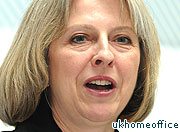A parliamentary committee on human rights has raised concerns that plans to crackdown on non-violent extremism, which include Extremism Disruption Orders, could have a “chilling effect” on free speech and freedom of religion.
The Joint Committee on Human Rights, a committee of MPs and Peers, set out their “initial concerns and questions” about the proposals in a letter to the Home Secretary.
The letter to Theresa May questioned whether decision-making under the proposals would be based on wide and “arbitrary discretion”, rather than well-defined law.
Fundamental rights
The letter also called for “non-violent extremism” and “British values” to be defined, and questioned whether individuals might be deemed extremist simply because of what they believe.
Mrs May was asked: “Will the Bill lead to a diminution in the law’s protection of fundamental rights and freedoms such as freedom of speech, freedom of religion and freedom to protest?”
The Committee also urged the Home Secretary to give case studies of how the current law is “insufficient to meet the problem that it is seeking to counter”.
They posed: “To what extent are the restrictions imposed by the Bill justified by the benefit of greater security?”
Scrutinise
The group referred to questions raised about the plans by David Anderson QC, the Independent Reviewer of Terrorism Legislation, and asked Mrs May to respond to these directly.
Mr Anderson had noted that the current broad definition of extremism could lead to state investigation of law-abiding people exercising their core democratic freedoms.
The Committee intends to scrutinise the forthcoming Bill in light of human rights laws, and said they would like a response from Mrs May by 10 December.
Defend Free Speech
Last month, a new campaign group Defend Free Speech was launched to oppose the Government’s plans for Extremism Disruption Orders.
The group includes The Christian Institute, the National Secular Society and the Peter Tatchell Foundation.
The website defendfreespeech.org.uk gives up-to-date information about the campaign, and helps people to contact their MP about the proposals.

